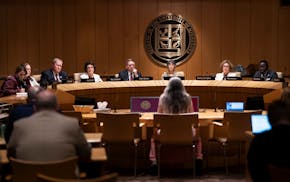There were many signs that the Trump administration would seek to dismiss the Justice Department's consent decree with Minneapolis that calls for far-reaching reforms to the city's Police Department.
A federal judge had to sign off on it before the decree could take effect. Now that may never happen. But state and city officials have been saying for months that some of the reforms have already been implemented and that others are in the works.
Here are details on what led to this and what might happen next.
What is a consent decree?
The 1994 federal crime bill gave the Justice Department the ability to investigate police agencies for patterns or practices of unconstitutional policing and to require them to achieve specific goals before federal oversight ends. The authority was passed by Congress in response to the 1991 Los Angeles police beating of Rodney King.
Are consent decrees effective?
Decrees have been credited with bringing significant reforms but scorned by critics as an ineffective waste of taxpayer money.
What prompted this consent decree?
Three years after the police killing of George Floyd, a Justice Department report released in June 2023 concluded the Minneapolis Police Department had engaged in a pattern of using unjustified deadly force, unlawfully discriminated against Black and Native American people, violated free-speech rights and at times caused trauma or death when responding to behavioral health crises.
How is a consent decree enforced?
Typically, a federal judge oversees it and appoints a monitor to shepherd it.
What judge is being asked to dismiss the consent decree?
U.S. District Judge Paul Magnuson, whose chambers are in St. Paul. Magnuson was nominated by Republican President Ronald Reagan and took the bench in November 1981. He was chief judge in the Minnesota District from 1994 to 2001. He moved to senior status in 2002. Magnuson presided over the successful civil rights prosecutions of the four officers who were also held criminally responsible for George Floyd's death in Hennepin County District Court.
What reforms are sought in the Minneapolis decree?
There are many, which include emphasizing de-escalation over the use of force; rooting out race-based practices, including decisions about when to stop a vehicle; protecting the rights of protesters; making officers accountable for their actions; and prioritizing nonofficer responses to calls tied to mental health.
Where else have law enforcement consent decrees been implemented?
Many police departments have been subjected to consent decrees. They include Louisville, Ky., New Orleans, Detroit and Ferguson, Mo., to name a few.
Wasn't Minneapolis' police chief involved in the consent decree?
Brian O'Hara was hired as police chief in part because of his participation in a consent decree at his previous job in Newark, N.J. In 2020 — four years after a consent decree many said was long overdue — Newark saw crime drop and officers confiscate 500 guns, all without firing a single bullet or paying to settle a brutality case.
What happens if this decree goes away?
Minneapolis is already well into a similar court-enforceable agreement with the Minnesota Department of Human Rights, after the state performed its own investigation. Some reforms included in the federal consent decree are already in motion under the state agreement.
Sarah Nelson, Andy Mannix and Elliot Hughes of the Minnesota Star Tribune contributed to this story, which also contains material from the Associated Press.
Things to know about the retrial of Karen Read in the killing of her police officer boyfriend

Foundation submitted voter registration applications with fake IDs, charges say

University of Minnesota faculty and students urge Regents to reject budget cuts and tuition hikes

Teenage boy arrested in connection with fatal shooting outside Northtown Mall

